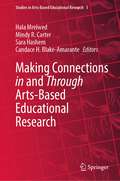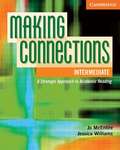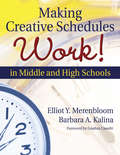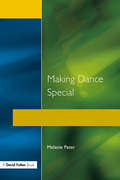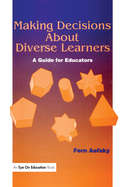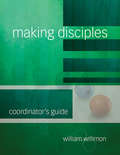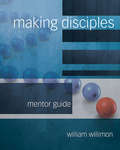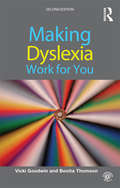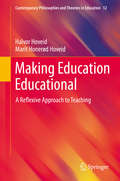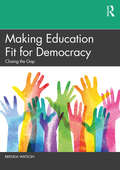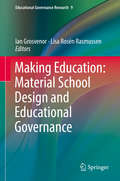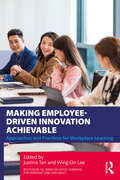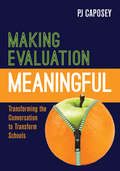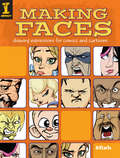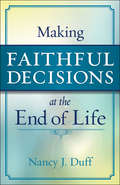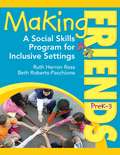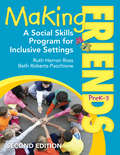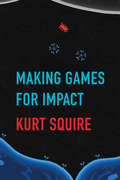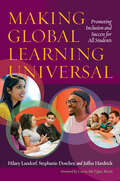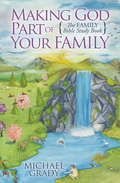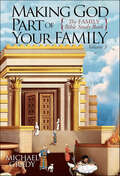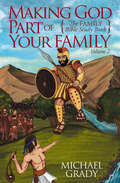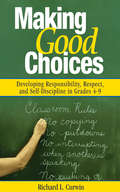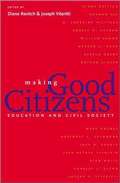- Table View
- List View
Making Connections in and Through Arts-Based Educational Research (Studies in Arts-Based Educational Research #5)
by Mindy R. Carter Hala Mreiwed Sara Hashem Candace H. Blake-AmaranteThis book explores the connections made in and through arts-based educational research through four themes: socially engaged connections, cultural connections, personal and pedagogical connections, and making connections during the COVID-19 pandemic. It emerges from the 3rd bi-annual 2020 Artful Inquiry Research Group symposium on the theme of “connections”. The symposium brought together artists, community members, teachers, students, and researchers through a virtual platform to examine the way(s) in which the arts can help connect people, ideas, and spaces/places in a pandemic reality. Art plays a predominant role in each chapter as authors weave their research and art-based understandings together. This book is a valuable teaching resource for undergraduate and postgraduate courses in teaching, anthropology, digital ethnography, autoethnography, cultural studies, and communications. It is of interest to higher education students, academic researchers, and teachers exploring arts-based methodologies in the fields of creative practice and creativity studies, communications, critical studies, sociology, sciences, teacher education, and the arts.
Making Connections, Intermediate Student's Book: A Strategic Approach to Academic Reading and Vocabulary
by Jessica Williams Jo McentireMaking Connections Intermediate is a reading skills and strategies book that prepares students for college-level reading. It has six high-interest thematic units, each with multiple readings. The readings are written in an accessible academic discourse style, providing practice for intermediate-level students who will eventually need to access authentic academic text.
Making Creative Schedules Work in Middle and High Schools
by Elliot Y. Merenbloom Barbara A. KalinaThis practical, user-friendly resource provides a step-by-step process for restructuring blocks of learning time to improve student-teacher relationships and promote more positive learning experiences.
Making Dance Special
by Melanie PeterFirst Published in 1998. Routledge is an imprint of Taylor & Francis, an informa company.
Making Decisions About Diverse Learners
by Fern AefskyThis book is for building level administrators who work with students (and their families) who have been classified as educationally disabled. It provides practical information about programming options, ranging from self-contained special education classes to inclusive classrooms. It also contains activities, worksheets, and report templates to assist you as you deal with these difficult issues.
Making Disciples: Coordinator's Guide
by William H. WillimonMaking Disciples is a 13-session mentor-based confirmation program that pairs confirmands with adult mentors and guides them through a variety of learning experiences that will strengthen the student's understanding of the faith while connecting him or her with the community of believers in a personal way. It can be used as a stand-alone program, or in conjunction with your current curriculum as a special experiential unit. This is a confirmation program that is more like a process and less like a reading assignment, more engaging and congruent with the nature of the Christian faith than existing programs. Using an "apprenticeship" approach to confirmation Will Willimon produced a series of learning experiences where adult mentors and confirmands are both teachers and learners at the same time.This time-tested approach has been extensively revised and updated for usage in today’s churches that take seriously Christ’s command to be engaged in disciple making The Coordinator’s Guide can be used by the pastor, if that is how your congregation chooses to oversee and support the process of confirmation. However, it’s good to involve as many laypersons as possible in mentoring and guiding. This Coordinator’s Guide is designed to be easily used by a lay coordinator to support the mentors as they guide their confirmands through the journey toward confirmation.Topics explore the basics of Christian faith: •God •Jesus •the Holy Spirit •worship •the Bible •gifts •ministry •baptism •spiritual life •death and resurrection •the church
Making Disciples: Mentor Guide
by William H. WillimonMaking Disciples is a 13-session mentor-based confirmation program that pairs confirmands with adult mentors and guides them through a variety of learning experiences that will strengthen the student's understanding of the faith while connecting him or her with the community of believers in a personal way. It can be used as a stand-alone program, or in conjunction with your current curriculum as a special experiential unit. This is a confirmation program that is more like a process and less like a reading assignment, more engaging and congruent with the nature of the Christian faith than existing programs. Using an "apprenticeship" approach to confirmation Will Willimon produced a series of learning experiences where adult mentors and confirmands are both teachers and learners at the same time.This time-tested approach has been extensively revised and updated for usage in today’s churches that take seriously Christ’s command to be engaged in disciple making The bulk of the Mentor Guide is exactly the same as the Confirmand's Journal. You are encouraged to work through the activities right along with the confirmands and to complete the activities and writing assignments just as he or she does. By working along with your confirmand you will demonstrate the need to keep learning and growing.Topics explore the basics of Christian faith: •God •Jesus •the Holy Spirit •worship •the Bible •gifts •ministry •baptism •spiritual life •death and resurrection •the church
Making Dyslexia Work for You
by Vicki Goodwin Bonita ThomsonWritten for dyslexic adults or anyone who thinks they might be dyslexic, this bold and imaginative book is deliberately concise and easy to dip into. User-friendly, essential guide to the world of study and work for anyone with dyslexia; Identifies the key needs of adults and young people who are dyslexic; Encourages them to put together their own package of ideas and strategies for success; Offers practical activities, examples and support covering reading, memory, organization, self-esteem, IT and dyslexia in the workplace; Over 100 topics from this book are expanded on our online resource. This unique guide to overcoming the day-to-day difficulties associated with dyslexia will also be of great interest to employers, colleagues, teachers, friends and family of those with dyslexia.
Making Education Educational: A Reflexive Approach to Teaching (Contemporary Philosophies and Theories in Education #12)
by Halvor Hoveid Marit Honerød HoveidThis book is an argument for reflexivity in the act of teaching, which means to acknowledge that intention guides the act of teaching. Teaching must create attention towards processes of collectivity in the classroom. Today, teaching is both acts of expressing knowledge and acts of securing justice to all students through a mediation of knowledge. Teaching therefore expresses both knowledge with reference to school subjects, and justice according to the distribution of this knowledge.The authors argue for teaching as the driver of education. To pay attention to teaching is to pay attention to that which is inside the system of education. To consider education as a mediation of knowledge between generations, places teaching as an act of performing the content of education, in a class in a school. The complexity of these processes is easily overlooked when education is used as a means in competitive economies. The approach taken in this text is that deliberations about teaching must be based on historicity. The support for this argument builds on a reading of the French philosopher Paul Ricoeur.The book addresses teaching as an integral part of the learning process. In education today, everything seems to be concentrated around learning, as if teaching no longer takes place. Teachers and teacher educators need a language to discuss and understand teaching, both as personal and institutional actions. A Ricoeurian approach to a discussion on teaching as a reflexive and institutional practice, provides a timely approach to important questions related to teaching in our day and age.
Making Education Fit for Democracy: Closing the Gap
by Brenda WatsonDewey wrote his celebrated book on Democracy and Education over a hundred years ago. Making Education Fit for Democracy asks why education has nevertheless failed to deliver such crucial support for democracy and how it should change to reflect ethical and social responsibilities. It seeks to shed light on what has gone wrong and how it can be put right. Reforming an antiquated system of education should be a matter for public debate. This book is written not only for those currently involved in delivering education, but also for the general public. Arguing that education needs to be holistic, encouraging open-mindedness and developing a wide range of interests, it: Highlights the role of education in supporting democracy Promotes nurture in civilising values over mere information-giving Puts exams and accountability into perspective Seeks to bridge the gulf between schooling and life Argues for the reform of the whole system of education Seeks to use digital technology to personalise education Touching upon several issues currently under debate, such as the rise of populism, the role of religion and narrow subject curriculum, this book will be of interest to all students studying education as well as those involved in teacher education.
Making Education: Material School Design and Educational Governance (Educational Governance Research #9)
by Ian Grosvenor Lisa Rosén RasmussenThis book brings together the notions of material school design and educational governance in the first such text to address this critical interrelationship in any depth. In addressing the issue of governance through analysing current and historical material school designs, it looks at the intersection of politics, economics, aesthetics and pedagogical ideas and practices. More specifically, it explores and unfolds educational governance as it is constituted, materialized and transformed in and through material school designs. It does so by studying a range of issues: from the material and aesthetic language of schooling to the design of the built environment, from spatial organization to the furnishing and equipment of classrooms, and from technologies of regulation to the incorporation of tools of learning. The book presents examples from Europe, Latin and Central America and the United States, and relates to the past, present and future of governance and school design. It focuses on design processes and on designers/architects and people involved in the planning of school design, as well as on school leaders, teachers and pupils adopting, inhabiting and re-shaping them in everyday school life. Furthermore, the book discusses how to study governance by material school design, and how to act upon governance by material design on wishful, actual and ethical terms.
Making Employee-Driven Innovation Achievable: Approaches and Practices for Workplace Learning (Routledge-IAL Series on Adult Learning for Emergent Jobs and Skills)
by Wing On Lee Justina TanThis volume guides workplace trainers in teaching the significance of Employee-Driven Innovation (EDI) and recognising that each and every employee is capable of being the driver of innovation. Given that innovation has become imperative to unlock competitive advantage, and that employees are increasingly regarded as a quintessential aspect of innovation, this focus on EDI and how to enable it is both necessary and opportune. The book is split into three parts: first focusing on helping trainers to address the challenges of getting employees to engage in innovative work besides their regular job tasks. How can organisations instil this mindset in their employees who see themselves as stalwarts of status quo? The book then turns to how organisations can engage employees in innovation, with an accompanying emphasis that the enactment of EDI may not follow a prescribed or planned flow. It then closes by offering real-world examples of the unfolding of EDI in both the Finnish and Singaporean contexts. The book is aimed at educating enterprises, both employers and workplace trainers, and adult educators in the practices and approaches to engage employees in innovation. It seeks to bridge, specifically the theory-practice nexus of EDI, and nudge the enterprises and TAE (training and adult education) practitioners that have yet to involve or engage employees systematically in innovation to seriously consider it.
Making Evaluation Meaningful: Transforming the Conversation to Transform Schools
by P J CaposeyRe-evaluate your perspective on teacher evaluation to truly transform school performance! The tools, strategies, and reflections in this book provide realistic solutions to the problem faced by many schools: meaningless evaluation. A considerable amount of time, energy, and money is spent on the teacher evaluation process, yet the question remains whether it is truly transforming the learning of teachers and, therefore, students. This practical guide shows how evaluation can become the tie that binds all school improvement activities together to: Bring clarity and purpose to all educators making their roles more effective Improve teacher practice since they receive better support Increase student achievement and overall school culture "For years, building leaders have been agonizing over teacher evaluations, pouring countless hours into a practice that consistently fails to produce the desired result; more meaningful conversations that produce improved quality instructional practices and increases in student achievement. In his book, Making Evaluation Meaningful, PJ Caposey shares a step by step framework filled with quick & easy to follow "Tips for Tomorrow," as well as detailed examples to help you shift your mindset and behave yourself to a more effective instructional leader. This book will leave you questioning your own evaluation system while at the same time inspiring you to re-commit the time and resources needed to help grow and develop your teachers." —Jimmy Casas, Principal and CEO " PJ Caposey, through a practitioner lens, has developed an incredible guide that not only helps to demystify the evaluation process, but also provide ready-to- use strategies to ensure reflection and growth are the result. In the end evaluation must be meaningful for both parties. This book will help get you there." —Eric Sheninger, Author/Consultant, Senior Fellow/Thought Leader "PJ Caposey has developed a great resource on teacher evaluation that actually provides realistic, encouraging, and supportive guidance instead of an arbitrary checklist!" —Larry Ferlazzo, Teacher, Author and Education Week Teacher advice blogger Luther Burbank High School, Sacramento, CA
Making Evaluation Meaningful: Transforming the Conversation to Transform Schools
by P J CaposeyRe-evaluate your perspective on teacher evaluation to truly transform school performance! The tools, strategies, and reflections in this book provide realistic solutions to the problem faced by many schools: meaningless evaluation. A considerable amount of time, energy, and money is spent on the teacher evaluation process, yet the question remains whether it is truly transforming the learning of teachers and, therefore, students. This practical guide shows how evaluation can become the tie that binds all school improvement activities together to: Bring clarity and purpose to all educators making their roles more effective Improve teacher practice since they receive better support Increase student achievement and overall school culture "For years, building leaders have been agonizing over teacher evaluations, pouring countless hours into a practice that consistently fails to produce the desired result; more meaningful conversations that produce improved quality instructional practices and increases in student achievement. In his book, Making Evaluation Meaningful, PJ Caposey shares a step by step framework filled with quick & easy to follow "Tips for Tomorrow," as well as detailed examples to help you shift your mindset and behave yourself to a more effective instructional leader. This book will leave you questioning your own evaluation system while at the same time inspiring you to re-commit the time and resources needed to help grow and develop your teachers." —Jimmy Casas, Principal and CEO " PJ Caposey, through a practitioner lens, has developed an incredible guide that not only helps to demystify the evaluation process, but also provide ready-to- use strategies to ensure reflection and growth are the result. In the end evaluation must be meaningful for both parties. This book will help get you there." —Eric Sheninger, Author/Consultant, Senior Fellow/Thought Leader "PJ Caposey has developed a great resource on teacher evaluation that actually provides realistic, encouraging, and supportive guidance instead of an arbitrary checklist!" —Larry Ferlazzo, Teacher, Author and Education Week Teacher advice blogger Luther Burbank High School, Sacramento, CA
Making Faces: Drawing Expressions For Comics And Cartoons
by 8fishChances are, you already know how to draw some expressions. But face it, your stories can only get so far with "happy," "sad" and "angry." In order to give your characters some character, you need to know what they look like when they're about to sneeze, when they smell something stinky or when they're flirting, horrified or completely blotto. Lucky for you, that's what this book is all about! Making Faces contains everything you need to give your characters a wide range of expressions! Part 1: The Basics. How to draw heads, mouths, noses and eyes, and how they change shape when they move.Part 2: The Faces. Over 50 step-by-step demonstrations for a variety of expressions divided into scenarios. Each scenario shows four or five expressions from a single character, from simple emotions to more subtle and complex variations, so you see how a face changes with each emotion. Sidebars illustrate the same expressions on a variety of other characters.Part 3: Storytelling.How to move your story along using expression, point of view, body language and composition. See how it all comes together with damsels in distress, a noir-style interrogation, a Western standoff and other situations. Illustrated with a diverse cast of characters from hobos to superheroes to teenage girls, this guide will help you create the looks that say it all.
Making Faithful Decisions at the End of Life
by Nancy DuffBy exploring the ethics of resisting and accepting death from a Christian perspective, Nancy Duff encourages Christians to talk about death in the context of Christian faith. Making Faithful Decisions at the End of Life helps readers use biblical and theological perspectives regarding death to inform end-of-life decisions, consider where they stand on withdrawing life support and supporting death with dignity laws, and take steps in planning for their own future.
Making Friends PreK3: A Social Skills Program for Inclusive Settings
by Beth Roberts-Pacchione Ruth Herron RossResearch shows that a child's social and behavioral skills affect the development of cognitive and physical abilities. Set students on a path to success and have fun doing it with this newly retitled edition of the popular Wanna Play. The authors provide hundreds of activities that help children learn how to behave appropriately and make friends. Included are tools for teaching emotion regulation, team playing, and body safety to all children, making this resource ideal for use in inclusive settings. New features include: A social interaction checklist for identifying learners' strengths and weaknesses Teacher-friendly activities that can be used in small groups or with the whole class A chapter on teaching emotions and communication skillsStudents with social challenges benefit from direct instruction, and early intervention helps prevent behavior problems and pave the way to academic success. This hands-on guidebook gives teachers, counselors, behavior therapists, and caregivers a wealth of easily implemented and fun-filled ways to enhance children's skills in all areas of social interaction.
Making Friends, PreK–3: A Social Skills Program for Inclusive Settings (Second Edition)
by Ruth Herron Ross Elizabeth L. Roberts-PacchioneHelping students develop healthy social skills is child’s play <p><p> This newly retitled edition of the popular Wanna Play provides hundreds of fun and updated activities that help children learn how to behave appropriately and make friends. Ideal for teachers, counselors, and behavior therapists, included are tools for teaching emotion regulation, team-playing, and body safety to all children, making this resource an excellent fit for inclusive settings. New features include: <p> A social interaction checklist for identifying learners’ strengths and weaknesses <p> Teacher-friendly activities that can be used in small groups or with the whole class <p> A chapter on emotions
Making Games for Impact
by Kurt SquireDesigning games for learning: case studies show how to incorporate impact goals, build a team, and work with experts to create an effective game.Digital games for learning are now commonplace, used in settings that range from K–12 education to advanced medical training. In this book, Kurt Squire examines the ways that games make an impact on learning, investigating how designers and developers incorporate authentic social impact goals, build a team, and work with experts in order to make games that are effective and marketable. Because there is no one design process for making games for impact—specific processes arise in response to local needs and conditions—Squire presents a series of case studies that range from a small, playable game created by a few programmers and an artist to a multimillion-dollar project with funders, outside experts, and external constraints. These cases, drawn from the Games + Learning + Society Center at the University of Wisconsin–Madison, show designers tackling such key issues as choosing platforms, using data analytics to guide development, and designing for new markets. Although not a how-to guide, the book offers developers, researchers, and students real-world lessons in greenlighting a project, scaling up design teams, game-based assessment, and more. The final chapter examines the commercial development of an impact game in detail, describing the creation of an astronomy game, At Play in the Cosmos, that ships with an introductory college textbook.
Making Global Learning Universal: Promoting Inclusion and Success for All Students
by Hilary Landorf Stephanie Doscher Jaffus HardrickCo-published with While there is wide consensus in higher education that global learning is essential for all students’ success, there are few models of how to achieve this goal. The authors of this book, all of whom are from one of the nation’s largest and most diverse research universities, provide such a model and, in doing so, offer readers a broad definition of global learning that both encompasses a wide variety of modes and experiences—in-person, online, and in co-curricular activities at home and abroad—and engages all students on campus. They provide a replicable set of strategies that embed global learning throughout the curriculum and facilitate high quality, high-impact global learning for all students.The approach this book describes is based upon three principles: that global learning is a process to be experienced, not a thing to be produced; that it requires all students’ participation—particularly the underrepresented—and cannot succeed if reserved for a select few; and that global learning involves more than mastery of a particular body of knowledge. The authors conceptualize global learning as the process of diverse people collaboratively analyzing and addressing complex problems that transcend borders of all kinds. They demonstrate how institutions can enable all students to determine relationships among diverse perspectives on problems and develop equitable, sustainable solutions for the world’s interconnected human and natural communities. What’s more, they describe how a leadership process—collective impact—can enable all stakeholders across departments and disciplines to align and integrate universal global learning throughout the institution and achieve the aims of inclusive excellence.Providing examples of practice, this book:• Offers a model to make global learning universal;• Provides a definition of global learning that incorporates diversity, collaboration, and problem solving as essential components; • Describes effective leadership for implementation consistent with the attributes of global learning;• Illustrates integrative, high-impact global learning strategies within the access pipeline, students’ coursework, and co-curricular activities; • Offers practical strategies for global learning professional development, student learning assessment, and program evaluation;• Promotes inclusive excellence through universal global learning.
Making God Part of Your Family: The Family Bible Study Book
by Michael GradyIf your family thinks the Bible is boring, it&’s probably because they don&’t know the full story! Veteran Bible teacher Michael Grady has compiled the Old Testament stories into concise, thought provoking doses intended to stimulate family discussions. The Old Testament is a history of God&’s family and you just might be surprised to learn who&’s in your family tree! These stories provide a unique combination: they are both simple enough for your children to understand and deep enough for parents to grow in the knowledge and wisdom of God&’s Word. This vibrant, carefully researched volume will bring your family closer together and help you clearly establish your family&’s identity as children of God and brothers and sisters of Jesus. Making God Part of Your Family is not just a book of Bible stories. It is a study book. Whether your goal is to spend 10–15 minutes on a dinner-time devotional or bedtime reading with your children, or spend more in-depth study time together once a week, this flexible resource will make it easier to carve out time amidst hectic schedules to study the Bible together, and help you to: Develop a better and deeper relationship with God our Father, and his son, JesusLearn how we are part of God&’s familyLearn how God expects us to live amidst the joys and sorrows of lifeApply practical lessons and eternal truths to the situations you face today
Making God Part of Your Family: The Family Bible Study Book Volume 3
by Michael GradyMaking God Part of Your Family Volume 3 strives to bring God’s plan to life for individuals and their families as He chose to reveal these truths through the stories in the Old Testament.Most would agree that the Old Testament stories can be difficult to relate to and understand. Veteran Bible teacher Michael Grady retells the Old Testament stories in concise, thought-provoking doses that are easy to understand and intended to stimulate family discussions. He demonstrates that the Old Testament stories are much more than just a history of the Israelites (God’s chosen family); they are parables detailing God’s guide to living and his eternal plan for redemption and salvation for all who choose to believe. The stories in Making God Part of Your Family Volume 3 provide a unique combination—they are both simple enough for children to understand and deep enough for parents to grow in the knowledge and wisdom of God’s Word. This vibrant, yet carefully researched volume brings families closer together and helps them clearly establish their identity as children of God and brothers and sisters of Jesus.
Making God Part of Your Family: The Family Bible Study Guide -volume 2 (The Family Bible Study Book #2)
by Michael GradyA veteran Bible teacher offers Old Testament stories and family discussion prompts in this accessible yet thoughtful Bible study book. In Making God Part of Your Family, Bible teacher Michael Grady presents the Old Testament stories in concise, thought provoking doses intended to stimulate family discussions. These stories are both simple enough for your children to understand and deep enough to offer new insights for parents who want to further their knowledge of God&’s Word. More than just a collection of Bible stories, this study book can help you more firmly establish your family&’s identity as children of God and brothers and sisters of Jesus. Whether your goal is to spend ten to fifteen minutes a day on a dinner-time devotional or bedtime reading with your children or spend more in-depth study time together once a week, this flexible resource will make it easier to establish a family routine amidst hectic schedules. Making God Part of Your Family can help you: Develop a deeper relationship with God our Father, and his son, JesusLearn how we are part of God&’s familyLearn how God expects us to live amidst the joys and sorrows of lifeApply practical lessons and eternal truths to the situations you face today
Making Good Choices: Developing Responsibility, Respect, and Self-Discipline in Grades 4-9
by Richard L. CurwinThis guidebook offers teachers eight ready-to-use strategies to help students make good choices for good behavior in the classroom as well as in the real world.
Making Good Citizens: Education and Civil Society
by Diane Ravitch Joseph P. ViterittiLeading thinkers from a variety of disciplines probe the relation between a healthy democracy and education. Contributors such as Jean Bethke Elshtain, Nathan Glazer, Robert Putnam, Jack Rakove, and Alan Wolfe discuss topics that range from the place of religion in public life to political conflict in a pluralist society to the problems of racial inequality.
